When finalizing your Winter 2022 schedule, you might notice a new filter on Beartracks. The Students’ Union and the Registrar's office have recently implemented a label that helps students easily identify if a course has additional textbook or material costs. A course with the Zero Textbook Cost (ZTC) label is one where materials are free for students to access instead of textbooks that must be purchased. In addition to making textbook costs more transparent to students, this pilot project also recognizes instructors' efforts to reduce costs for their students.
What is ZTC?
This Fall, the University of Alberta launched its first-ever Zero Textbook Cost (ZTC) Pilot Program. Since its inception, for the Fall 2021 semester more than 500 instructors indicated that their courses are ZTC. This equates to more than 600 courses at the University of Alberta!
If you were to estimate the cost savings for students this semester alone, it would equate to millions of dollars saved in course materials when instructors switch to ZTC. The program helps increase transparency and accessibility for students looking to save some money while they plan for their next semester.
ZTC courses and degrees emerged from open educational resources (OER). These are free open-access materials instructors can use. The creation of this pilot program sets the stage for the U of A to re-evaluate the role that textbooks and other paid materials play in education.
Why should you look for open education resources?
Open educational resources are teaching, learning and research resources that are free of cost and access barriers, and carry legal permission for open use. National and international strategic efforts to reduce material costs in high enrolment courses through OER means there is a growing amount of free open materials for instructors who choose to remove paid resources. By using zero-cost learning materials and quality OER instructors allow students to have equitable access to the materials they need to learn, including textbooks, video, audio, journal articles and more.
How do you use the ZTC indicator?
- To find a class with the ZTC designation on Beartracks, first login and select “Manage Classes.”
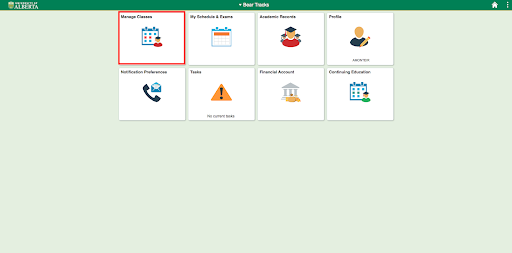
- Select the term you are interested in registering for (e.g. Fall 2021).
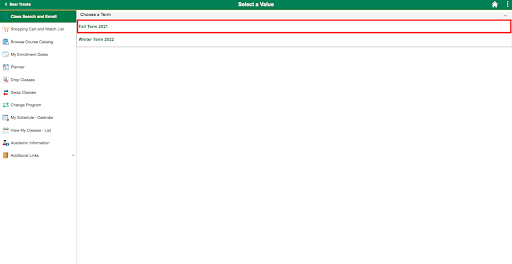
- Enter the course search parameters you are looking for click the search button.
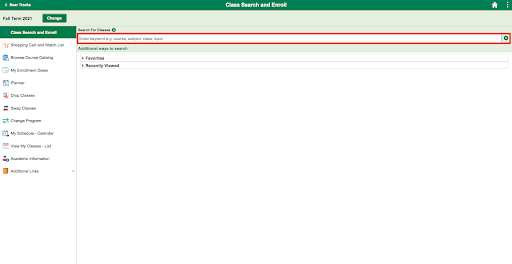
- To see which courses are indicated as ZTC, scroll to the bottom of the left sidebar and select “Zero Textbook Cost” in the filter criteria.
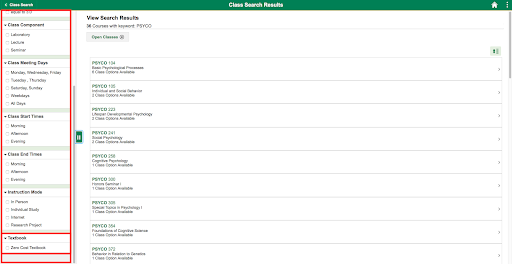
- Once filtered, the course listing will show you which courses are ZTC!
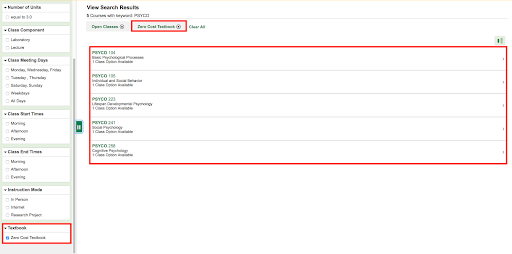
Future of the pilot program
The large number of ZTC courses identified since the inception of this pilot program is encouraging. It tells us that our instructors are naturally trending toward critical evaluation of instructional materials and value making our education more accessible and affordable. To keep this program’s momentum going, I will keep having conversations with instructors about how they get the support they need to teach in a ZTC format and empower students to do the same. I also hope to enhance the university’s recognition mechanisms to acknowledge instructors who reduce students’ learning barriers. As long as we continue to have these conversations, we help shape a promising future for educational materials that enhance our education and make it more affordable.
 About Abner
About Abner
Abner is the Vice-president Academic for the Student’s Union and a student in the Faculty of Kinesiology, Sport and Recreation with a passion for student governance and exercise science. Throughout his degree, Abner has immersed himself in the University of Alberta community. He has participated in student governance at various levels, including General Faculties Council (GFC), Students' Council and as President of the Kinesiology, Sport, and Recreation Student Society (KSRSS). His passion for motor learning has led him to research perceptual-motor behaviour and promote health and wellness inside and outside the University of Alberta community.
